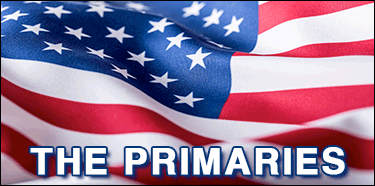By Jim Ellis
 Aug. 6, 2018 — The Aug. 7 primaries that arrive tomorrow decide important nomination campaigns in Kansas, Michigan, and Washington; the Missouri political card is already virtually set. Today, we look at Kansas and Missouri, followed tomorrow by Michigan and Washington.
Aug. 6, 2018 — The Aug. 7 primaries that arrive tomorrow decide important nomination campaigns in Kansas, Michigan, and Washington; the Missouri political card is already virtually set. Today, we look at Kansas and Missouri, followed tomorrow by Michigan and Washington.
KANSAS
The Sunflower State governor’s race is the key feature in the Republican primary, as Gov. Jeff Colyer (R) appears to be struggling to cobble together a victory coalition in tomorrow’s primary election. Colyer ascended to the governorship when incumbent Gov. Sam Brownback (R) accepted a position in the Trump Administration. Colyer is attempting to repel a strong challenge coming from activist conservative Secretary of State Kris Kobach, who is leading in the latest polling.
According to the Trafalgar Group (July 30-Aug. 2; 1,546 likely Kansas Republican primary voters), Gov. Colyer trails Secretary Kobach, 43-36 percent. But the Remington Research Group, polling in the same period (Aug. 2; 859 likely Kansas Republican primary voters), sees a tie between the two men with both attracting 32 percent support. Former state Sen. Jim Barnett and State Insurance Commissioner Ken Selzer are at or below 13 percent preference in both polls.
Democrats also see a multi-candidate campaign, and it appears that state Sen. Laura Kelly (D-Topeka), the party activists’ favorite, is positioned to win the nominating election. She faces former Agriculture Commissioner Josh Svaty, and retired Wichita Mayor Carl Brewer, but Sen. Kelly appears to have constructed the appropriate coalition to achieve victory tomorrow night.
The Republicans get a major break in the general election because wealthy Independent candidate Greg Orman will be a factor in the fall campaign. With an appeal to the populist liberal political sector, Orman will draw votes away from Kelly, thus again making tomorrow’s Republican nominee the race favorite in the Kansas general election.
In the congressional contests, seven Republicans, including three state senators, one state representative, a former state House speaker, and a defense contractor whose father is heavily investing in an independent expenditure for him, are vying for the party nomination to succeed retiring Rep. Lynn Jenkins (R-Topeka) in the occasionally competitive 2nd District. Though the seat has a strong Republican tradition, the inclusion of the capital city of Topeka and the University of Kansas in Lawrence means that a Democratic nominee such as former state House minority leader and 2014 gubernatorial nominee Paul Davis becomes a clear factor in the general election.
In the 3rd District, six Democrats are running for the right to challenge four-term Rep. Kevin Yoder (R-Overland Park) in the general election. Claims of vulnerability surround Rep. Yoder, as they did two years ago, but he recorded a 10-percent victory margin in 2016 against businessman Jay Sidie, who is among the Democrats running for the nomination tomorrow.
In the 4th District, freshman Rep. Ron Estes (R-Wichita) faces a rather unusual situation. His Republican primary opponent is also named Ron Estes. To mitigate the confusion, election officials have allowed the congressman to appear on the ballot as US Rep. Ron Estes against his opponent, Ron M. Estes.
MISSOURI
Though Sen. Claire McCaskill has six Democratic opponents tomorrow and Attorney General Josh Hawley sees 10 Republicans lining up against him, both are virtually assured of easily winning the respective major party nominations. The general election has seemingly already been on for months, so the primary will likely alter the Senate race in only a small way.
There is no doubt that this campaign will remain in the toss-up category all the way to Election Day. Sen. McCaskill has already raised almost $23 million for the race, but has spent all but $6.6 million. AG Hawley’s take pales in comparison — raising $5.3 million with $2.3 million in the bank — but it is obvious that both sides will have plenty of resources with which to tell their story. And, the numbers don’t even include the untold millions that will be spent for and against each of them from outside independent sources.
Five of the state’s eight US House members face primary competition tomorrow, but none appears serious, and all eight incumbents will be on the ballot in November.
The Missouri congressional campaigns look to be relatively quiet even in the general election, though three-term Rep. Ann Wagner (R-St. Louis County) has drawn a credible opponent. Poised to claim the Democratic nomination tomorrow within a field of five candidates is attorney and law school professor Cort VanOstran who has over $860,000 for the race. Still, drawing Rep. Wagner will likely prove too much, as she accumulated just under $3 million in her campaign account.
Originally, a budding US Senate candidate, Rep. Wagner began raising funds early in the cycle throughout the state before she decided to pass on the statewide campaign.
